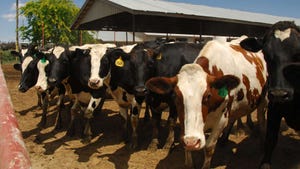Tax bill offers cooperative Section 199 fix
Legislation allows cooperative members to claim a new 20% deduction on payments from a farmer cooperative.

The final tax bill compromise between the House and Senate addresses the loss of the Section 199 deduction to help protect farmer-owned businesses from a major tax increase at a time when America’s farm sector is struggling with low commodity prices and reduced incomes.
Neither the House or Senate approved versions included the Section 199 deduction, also known as the Domestic Production Activities Deduction (DPAD), which limit business interest expense deductions for larger businesses and eliminate the net operating loss carryback provision. However, the final tax compromise reached Dec. 15 repeals the DPAD, but the legislation allows cooperative members to claim a new 20% deduction on payments from a farmer cooperative.
“The final tax package released on Friday repeals the DPAD, but the legislation allows cooperative members to claim a new 20% deduction on payments from a farmer cooperative. Cooperatives would also be able to claim the 20% deduction on gross income less payments to patrons, limited to the greater of 50% of wages or 25% of wages plus 2.5% of the cooperative’s investment in property. This favorable treatment for gross income will help minimize any potential increase in the tax burden on farmer-owned cooperatives,” explained Jim Mulhern, president and CEO of the National Milk Producers Federation (NMPF).
This important provision of the tax code applies to proceeds from agricultural products marketed through cooperatives, making the Section 199 an important means of reducing taxation for farmers and cooperatives alike. Cooperatives pass the vast majority of the benefit – nearly $2 billion nationwide – directly to their farmer owners, then reinvest the remainder in infrastructure improvements for the marketing and processing of food products, according to the National Council of Farmer Cooperatives.
Sen. John Hoeven (R., N.D.) and Sen. John Thune (R., S.D.) secured the amendment which was welcomed by those in the agricultural industry.
Mulhern said NMPF was grateful for numerous senators on both sides of the aisle who elevated this issue during the debate.
“America’s dairy farmers, who overwhelmingly rely on cooperatives to market their milk, appreciate the determined efforts by Sens. John Hoeven and John Thune, as well as multiple House members, including Agriculture Committee Chairman Mike Conaway (R., Texas), to seek a fair and reasonable solution to this challenge. Their efforts will help prevent a higher tax bill for cooperatives and avert the loss of economic activity in rural communities that these businesses help generate,” Mulhern said.
Chris Policinski, president and CEO of Land O’Lakes, said that Hoeven led the effort to ensure that eliminating the Section 199 deduction does not have the unintended consequence of raising taxes on producers during hard times across the countryside. “The provisions included in the final package will offset the loss of this deduction, we believe, and help encourage job creation and growth across rural America,” he said.
Jay Debertin, president and CEO of CHS Inc. added that the Section 199 deduction helped create jobs and broaden the tax base in many rural communities and the loss of the deduction would have had impacts far beyond agriculture. “Senator Hoeven has prevented that scenario through his efforts to make the new tax code work for co-ops and their members,” Debertin said.
The House-Senate Conference Committee signed the conference report on the joint compromise tax bill on Friday. The entire bill will now move forward to be voted on this week by the entire House of Representatives and Senate. The goal remains to get the bill before the President to sign before Christmas and it is expected that the Senate has the needed votes to pass the bill.
Congress is also up against a tight deadline this week to pass a budget deal to fund the government for fiscal year 2018. It is unknown whether the Senate has the needed 60 votes to pass the funding bill.
About the Author(s)
You May Also Like



.png?width=300&auto=webp&quality=80&disable=upscale)

